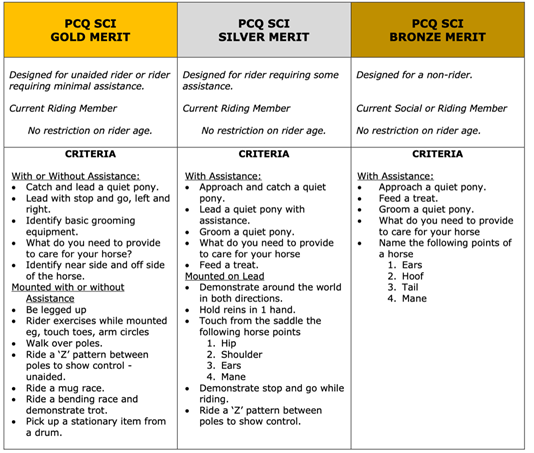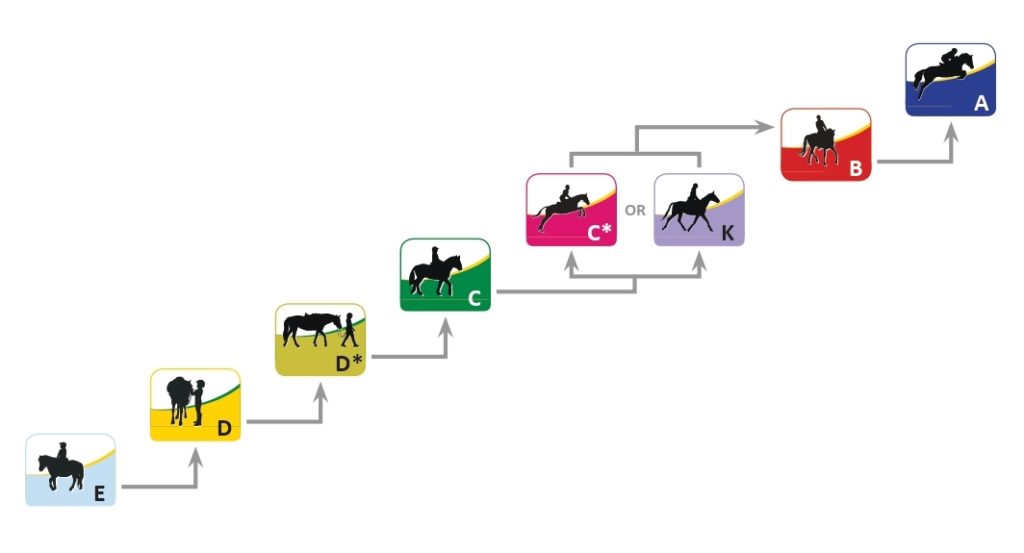Rider Accreditation
Rider accreditation is a crucial component of equestrian education and professional development. It ensures that riders meet established standards of safety and proficiency, thereby promoting excellence and safety in horse riding and equestrian sports. Whether for recreational enjoyment or professional advancement, accreditation provides a pathway for riders to achieve their equestrian goals and gain recognition for their expertise.
Getting accredited is a fun way to improve your skills and get recognized for your hard work. Whether you’re in it for fun, competition, or even a career with horses, it’s a great way to show you’re serious about your riding.
So, if you’re into horses and want to take your riding to the next level, rider accreditation is a great way to go!
In Queensland, we are very fortunate to have two pathways to achieving right accreditation. The first of these is the traditional panic club Australia system which involves working towards getting recognised by completing traditional certificate work.
The second pathway which is unique to Queensland is more of a self-paced approach that is very practical in its outcomes and offers a variety of methodologies to achieve the accreditation that one is seeking.
PCQ SCI MEDALS
Together, we can help young Pony Club(R) people to be practical horse persons. PCQ SCI Medals are non-competitive, self paced, practical horse person skills in a networking environment. PCQ Medals meets criteria for PCQ State Championships with discipline performance qualifications. Sign up today and become a lifelong Ambassador. Copper, Bronze, Silver, Gold Medals.
The Pony Club Queensland State Chief Instructor (SCI) Medals are a non-competitive, recognized program designed to encourage pony club members to progressively develop practical horseperson skills.
The PCQ SCI Medal is about personal practical horseperson development. The strength of the medal is our ability to maintain and retain practical horsepersons through Pony Club Queensland.
The PCQ SCI Medal concept is one of individual development. It presents Queensland pony club members a balanced, not-competitive progressive program of voluntary activities which encourages personal discovery and growth, self-reliance, perseverance, responsibility to themselves and service to the Equestrian community.
Queenslander’s on horses, be it in the military, on remote rural properties or at the Olympic games, have been recognised as “good horsemen”.
PCQ SCI medal system has been designed to acknowledge the good practical horseperson within Pony Club Queensland.
The practical principles of the Medal retain the real-world horseperson in our evolving and changing modern society, while in name acknowledge the leadership and commitment of the State Chief Instructor at the time.
PCQ SCI Medals are named in honour of the current PCQ SCI with each medal being individually numbered making it unique to the receiptent.
A PCQ SCI Copper Medal holder (12 yrs and under) meets the criteria to nominate for PCQ State Championships with discipline performance qualifications.
A PCQ SCI Bronze/Sliver/Gold Medal holder (13yrs and over) meets the criteria to nominate for PCQ State Champions with discipline performance qualifications.

PCQ State Chief Instructor Merits
PCQ SCI Merits are a non-competitive, recognised program designed to encourage pony club members, both social and riding members to participate and develop practical horsemastership as a complement and prelude to PCQ State Chief Instructor Medals.
PCQ SCI Merits comprises of 3 levels – Bronze, Silver & Gold, available to all current Pony Club Queensland members.

The Pony Club Queensland Proficiency Certificates are a structured series of tests designed to assess and enhance the knowledge, skills, and abilities of young equestrians as they progress through their riding careers. These certificates start from the foundational ‘E’ Certificate and go up to the advanced ‘A’ Certificate, each representing a different level of proficiency and understanding in horse riding and horse care.
Certificate Levels and Objectives

Here’s a brief overview of the certificates and what they aim to achieve:
- E Certificate:
- Target Age: Typically for very young or beginner riders.
- Focus: Basic knowledge of horse care and simple riding skills.
- Skills Assessed: Basic handling, grooming, and an introduction to riding at walk and trot.
- D Certificate:
- Target Age: Younger riders who have progressed from the ‘E’ Certificate.
- Focus: Elementary horse care and foundational riding skills.
- Skills Assessed: Riding independently at walk and trot, basic cantering, and understanding of horse behavior and safety.
- D (D Star) Certificate*:
- Target Age: Riders who are ready for more detailed knowledge.
- Focus: Intermediate horse care and riding skills.
- Skills Assessed: More confident riding in walk, trot, and canter, basic jumping, and deeper understanding of grooming, feeding, and horse health.
- C Certificate:
- Target Age: Intermediate riders aiming for comprehensive skillsets.
- Focus: Advanced knowledge of horse care and proficient riding skills.
- Skills Assessed: Competent riding at all gaits, introduction to lateral work, higher level of jumping, and extensive horse management including feeding, illness prevention, and tack care.
- C (C Star) Certificate*:
- Target Age: Advanced intermediate riders.
- Focus: Prepares riders for higher levels of competition and horse care.
- Skills Assessed: Advanced riding techniques, comprehensive horse care including veterinary knowledge, and deeper understanding of horse behavior and training.
- B Certificate:
- Target Age: Advanced riders with significant experience.
- Focus: High-level proficiency in horse riding and management.
- Skills Assessed: High competency in dressage, show jumping, cross country, and extensive horse management including nutrition, first aid, and stable management.
- H Certificate (Horse Management):
- Target Age: For riders focusing on horse management rather than riding.
- Focus: Detailed knowledge of horse care, excluding riding skills.
- Skills Assessed: Comprehensive horse management skills including advanced knowledge of equine health, nutrition, and care routines.
- A Certificate:
- Target Age: Very advanced riders, typically older teens or adults.
- Focus: Professional level of riding and horse management.
- Skills Assessed: Top-level riding skills in all disciplines, extensive knowledge of horse physiology and psychology, advanced horse care, and management strategies suitable for professional contexts.

| Certificate | Recommended Age |
| E Standard | Under 7 |
| D Standard | 7 Years |
| D Star Standard | 9 Years |
| C Standard | 12 Years |
| C Star Standard | 12 Years |
| K Standard | 14 Years |
| B Standard | 16 Years |
| A Standard | 17 Years |
Purpose and Benefits
- Encouragement of Learning: The certificate system encourages continuous learning and skill development, motivating riders to improve both their practical and theoretical knowledge.
- Structured Progression: Each level builds on the previous one, ensuring that riders develop a comprehensive skill set as they progress.
- Assessment and Feedback: The testing provides valuable feedback and an objective measure of progress, helping riders to identify areas for improvement.
- Safety and Competence: By ensuring that riders possess appropriate knowledge and skills for their level, the certificates promote safety and competence in horse handling and riding.
- Preparation for Competition: Higher-level certificates prepare riders for competitive equestrian events by enhancing their technical skills and horse management knowledge.
Obtaining the Syllabus
To undertake these certificates, it’s crucial for riders to obtain the Pony Club Australia Syllabus of Instruction. This syllabus details the requirements and expectations for each certificate level, offering comprehensive guidance for riders and instructors. It includes specific knowledge areas, practical skills, and the standards required for each certificate test.
- Where to Get It: The syllabus is typically available through local Pony Clubs or can be obtained directly from Pony Club Australia’s website or their national office.
Conclusion
The Pony Club Australia efficiency certificates provide a well-rounded educational pathway for young equestrians. They foster a thorough understanding of horsemanship and equip riders with the skills necessary for a lifetime of safe, knowledgeable, and enjoyable riding.
For further details or specific queries regarding the certificates, reaching out to your local Pony Club or visiting the Pony Club Australia website would be beneficial.

